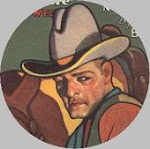Do I contradict myself?
Very well, then, I contradict myself;
(I am large—I contain multitudes.)
- Leaves of Grass, 1871-72 edition
Walt Whitman
The Good Gray Poet, Whitman, perhaps best summed up the contrary nature of the American character with these lines. In many ways, these lines also capture the contradictory artistic personality of Frederick Faust, better known to his audience as Max Brand.
Before I continue, let me briefly clarify my use of exemplary in the title of this essay. Here I use the word's definition, "serving as an illustration," not necessarily the typical definition, "worthy of imitation."
Frederick Faust publicly disdained the popular fiction he wrote. Yet he pounded out millions of words of it on reams of paper on a manual typewriter for years, and lived “high on the hog” (as one of his cowboy characters might say) thanks to that same writing. And while he was a very prolific creator of popular fiction in a variety of genres with a huge readership, he focused what he considered his true artistic skills on sweating for hours just to create two lines of classically styled poetry per day...poetry that had nearly no audience and – at best – a lukewarm critical reception.
He supported his family by publishing the bulk of his work printed on rough pulp paper in popular fiction magazines disdained by the literati (no matter what Frank Munsey said to buck the trends*); yet he peopled his stories with the same sort of heroic figures and conflicts that filled myths, legends, and romances of the Western canon. (That's Western as in Western Civilization.)
He banged out first-draft pulp, but read the classics. He entertained literary intellectuals at lavish dinner parties, yet published his work in magazines aimed at entertaining a common, mass audience.
Faust embodied the classic American conflict between the high and low culture, between intellectual pursuits and mass entertainment. It was a conflict that raged within his own psyche.
It's a conflict that continues today, represented by the minor flapdoodle raised by high-brow academic critic Harold Bloom when the National Book Awards gave a Lifetime Achievement citation to Stephen King.
As Timothy Burke writes in defense of King (which you can read at Burke's site, whose URL is http://www.swarthmore.edu/SocSci/tburke1/perma91603.html),
The culture which matters most is not merely the culture that aesthetes praise as worthy, but the culture which indures [sic], inspires, circulates, and is meaningful and memorable for many people, to the widest audiences. Sometimes that involves the adroit manipulation of archetypical themes and deep tropes of the popular culture of a particular time and place, and King does both of those things.
Burke might as well have been writing about Faust and his popular fictions filled with characters with the skills, abilities and emotions of demi-gods and the daily concerns and attitudes of the common man.
---
* What did Frank Munsey say?
Here's what he said:
"[Magazines (at the time Munsey got into the publishing business)] seemed to be made for an anemic constituency -- not for young, energetic, red-blooded men and women. Editors edited these magazines for themselves, not for the people. That is, they gave their readers what they (the editors) thought they ought to have. They were like architects who build a building for the outside rather than the inside -- build it for their own glory, rather than to make it serviceable for the uses for which it is designed.
These editors were not men of the world. They didn’t mingle with the world -- didn’t get down to the people and mix with the people. They lived in an artificial literary world, where they saw everything through highly-colored spectacles. There was a woeful lack of up-to-dateness about these magazines -- a woeful lack of human interest.
....
IT WAS THE MAGAZINE AND THE PRICE -- the theory of GIVING THE PEOPLE WHAT THEY WANTED, AND GIVING IT TO THEM AT THE RIGHT PRICE."
That's what Frank Munsey, creator of The Argosy and Munsey's Magazine, said.
You can read the entire article, "A Great Event for The Argosy," from the December 1907 issue, online at Larry Estep's great PulpGen site. Here's the URL for the article:
http://pulpgen.com/pulp/downloads/getpdf.php?id=354
LINKS:
Peter Haining, pulp collector and anthologist, mentions Frank Munsey in his article about the pulps and his coffee-table book, The Classic Era of American Pulp Magazines, at the Crime Time magazine site. Click here to read the article.
Wednesday, March 25, 2009
Max Brand: Exemplary American Author?
Labels:
Frank Munsey,
Harold Bloom,
Max Brand,
pulp magazine,
Stephen King
Subscribe to:
Post Comments (Atom)






1 comment:
Yes, Faust should be recognised. Sadly, there are many good authors who are no longer in print. I'm sure most of us have some of their books on our shelves even now. Styles/publishers change. Yet some stick around because they tap into the human condition, even if they're regarded as pulp writers, and Max Brand is one of those.
I never understood why one should only revere so-called literary writers. Me, I enjoy comics, genre fiction, classics and popular modern fiction. I'm entertained, moved and enlightened by all of the above.
Nik/Ross Morton
Post a Comment